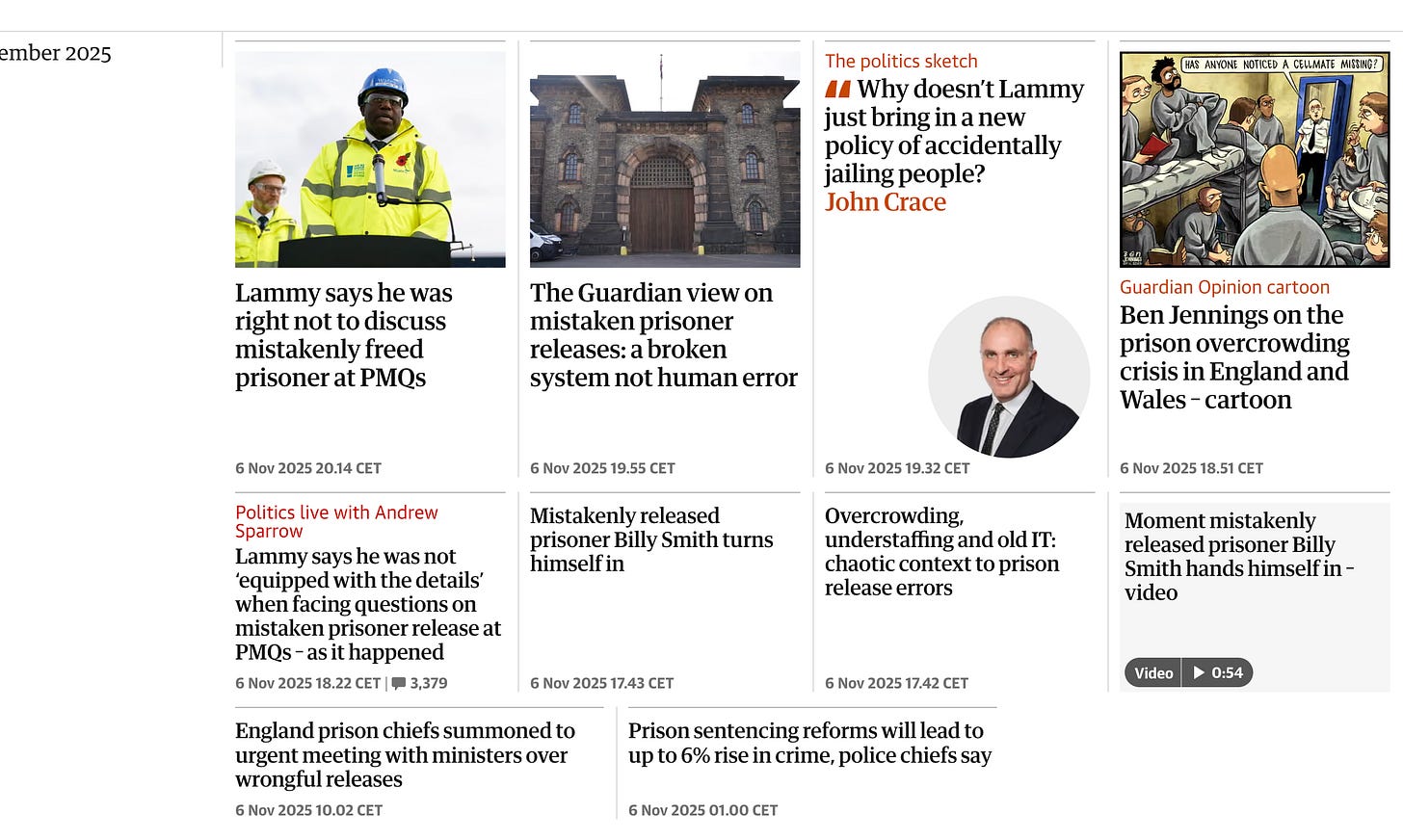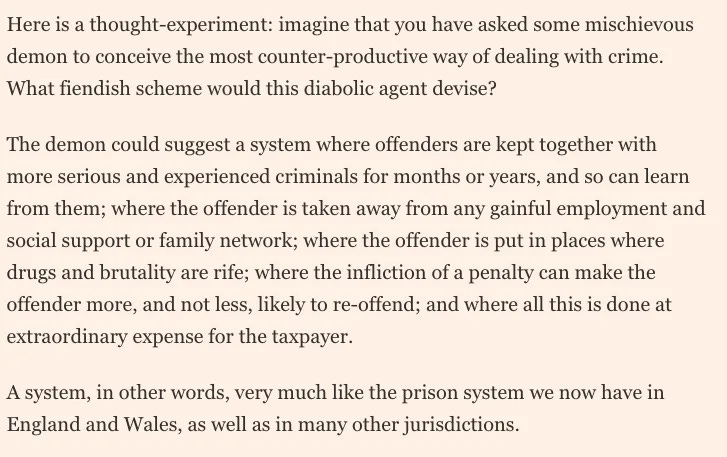The real problem which blights our prison and punishment system
The way we think about custodial sentences is what needs to change
*
Today’s news is about prisons:
*
Let us take a step back.
There is a serious addiction problem which blights our prison and punishment system.
The relevant addicts only make it worse for themselves and for everyone else.
And they never seem any nearer to breaking free from the cycles of despair and misery.
The addiction, of course, is that of our political and media classes to custodial sentences.
*
There are long-term, medium-term and short-term problems with our prisons.
*
The short-term problem is the general lack of funding, lack of direction and lack of thought about how to manage the prison estate. At the moment this general mess is breaking through into the national news because of mistaken prisoner releases.
But those mistaken releases - treated by many in media and politics as a gotcha against the government - are in merely obvious manifestations of the ongoing chaotic and dangerous conditions of our penal system.
*
The medium-term problem, at least in England and Wales, is the structural craziness of having the prison system as part of the ministry of justice, a small department (also responsible for courts and probation) that has little or no political gravity in Whitehall.
The decision of the Blair government in 2005 to create a “holistic” (vomit) MoJ by taking prisons and probation out of the Home Office and lumping it with the former Lord Chancellor’s department has led to our prisons being inherently underfunded ever since.
The Blair government made many bad decisions, but this is one of less famous but far more consequential ones.
*
The long-term problem is the fundamental assumption in our politics that the norm for punishment should be lengthy (and expensive) terms of imprisonment.
It is a fairly recent notion in historical terms, and only really came about in the early 1800s, after the general moral turn against corporal and capital punishments and the practical turn against transportation.
As I once put in a paragraph of which I am still proud:
“Here is a thought-experiment: imagine that you have asked some mischievous demon to conceive the most counter-productive way of dealing with crime. What fiendish scheme would this diabolic agent devise?
“The demon could suggest a system where offenders are kept together with more serious and experienced criminals for months or years, and so can learn from them; where the offender is taken away from any gainful employment and social support or family network; where the offender is put in places where drugs and brutality are rife; where the infliction of a penalty can make the offender more, and not less, likely to re-offend; and where all this is done at extraordinary expense for the taxpayer.
“A system, in other words, very much like the prison system we now have in England and Wales, as well as in many other jurisdictions.”
*
*
Perhaps one day, like slavery and witchcraft trials, sensible humane people will wonder why we ever did such a thing.
That is not to say there is a group for which detention is appropriate for public protections, and (notwithstanding the sentiments of some other liberals) there is a place for full-life tariffs for certain crimes.
But generally prison is a costly system for worsening the social problem of crime.
Other than a hundred-or-so prisoners with full-life tariffs, the assumption is that the prisoners will be one day released. It is just a way of delaying a problem.
Whatever the solution to crime, it is likely to involve punishments that do not snap and effectively extinguish social, community, family and employment ties - for it is those bonds which are more likely to bind people to more constructive pursuits and lead to meaningful rehabilitation.
*
But our political and media class are addicted to the bidding war of ever-heavier sentences, and the criminal division of the court of appeal and the sentencing council are content to nod-along with the wants of the addicts.
Yet we cannot afford this addiction.
We simply do not have the capacity to go along with what is demanded.
And so we get news stories like the ones that are now breaking.
Breaking news about a broken system.



For those who have entered the current prison system because of a personal addiction, from which they desperately wish to free themselves, and who need the support of an authority figure to assist them to do so, judicial monitoring - the regular review of those who have been so sentenced by the judge who sentenced them - may be the answer. That is what I have tried to portray in "Mentor and Monitor - a role for the judge", a concept of which I would also be proud were it to be more generally adopted, and which (like FDAC) I played a modest part in introducing to this jurisdiction.
Norway of course has a much smaller population, but what lessons, if any, could we learn and take on board from the way they handle punishment? If I’m not mistaken, the Norwegians have a significantly lower reoffending rate. They must be doing something right?